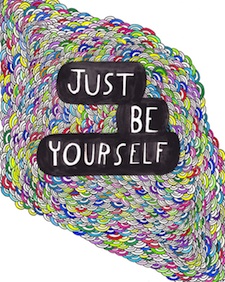It is so simple, really. In order to be likeable and persuasive in court all you have to do is:
•be yourself
•really listen
•make great eye contact
•smile more than you frown
•have a great voice
•gesture naturally
•become a fabulous story teller
Having trouble with one or two or all seven of these? Don't worry. Here is a series of exercises that can help you develop these tools of likeability and persuasion.
Be Yourself
 How many times have you heard this advice? It is the best. Of course, there's just one tricky part. No one tells you how to do this. Let me let you in on a secret – you have to not only figure out who you are you have to practice being yourself in court. Here is an exercise that helps you do both.
How many times have you heard this advice? It is the best. Of course, there's just one tricky part. No one tells you how to do this. Let me let you in on a secret – you have to not only figure out who you are you have to practice being yourself in court. Here is an exercise that helps you do both.
Turn on a video camera and point it at yourself.
•Start an opening statement for one of your cases. Deliver it to the camera for about a minute.
•Switch to the story of how you met your husband or wife. Deliver it to the camera for about a minute.
•Switch back to your opening statement and pick up where you left off. Deliver it to the camera for about another minute.
•Switch to the story of the scariest moment of your life. Deliver it to the camera for about a minute.
•Switch back to your opening statement and pick up where you left off. Deliver it to the camera for about another minute.
Turn off the camera and play back what you just recorded. Look at your demeanor. You may very well notice that you are at least two different people on your tape. The one who delivers your opening is your "lawyer" personality. The one who talks about being in love and scared is "the real you". You may notice that as you switch from a real life story back to your opening that your demeanor stays the same for a few seconds. You might find yourself completely stopping – unable to remember your opening. It isn't the opening statement you can't remember – it is that "the real you" is fighting the "lawyer" you.
Repeat this exercise using different stories from real life. Your goal? To deliver the opening statement as "the real you" instead of the "lawyer" you.
Really Listen
Do judges say that you don't listen to them? How about jurors? A juror provided one of my favorite comments ever made about an attorney: "He acted like a bad party guest during voir dire. You know – the guy who is just waiting for your lips to stop moving so that he can start talking about himself."
Before you can adjust your behavior so that you can listen to others, first you need to observe people who are really listening to you. How do you know that your spouse, your friend, your sister is actually listening to you? Here' how. People who listen:
•lean forward slightly toward the speaker
•make great eye contact
•nod to acknowledge that they hear and understand.
•say affirmative things like, "uh-huh" and "yes"
•have "agenda-less" expressions on their faces. For example, an open smile
•don't interrupt
•allow the words that the speaker tells them to affect their facial expressions
Now, practice these listening characteristics with the people you love and live with and with whom you work. You will be
amazed at the results. And you may actually discover you really are listening more!
Make Great Eye Contact
Ever heard the expression, "The eyes are the windows of the soul"?
Ever had your most beloved say, "You never look at me anymore"?
The most fun way to develop eye contact is to practice simply looking into the eyes of your most beloved without speaking for a full minute. Breathe and look. Now, take what you have learned
here to a small group of people. The next time you are talking in a small group, give one sentence to one person. The next to another. All the while you need to be looking at each person eyeball to
eyeball while breathing and speaking. Find yourself talking to the ground or to a spot next to someone? Redouble your efforts. Make sure you are speaking to a set of eyeballs. Once you can do this, you are ready to speak to jurors. One at a time. While really looking at them.
"This is a serious case. Of course I am not going to laugh or smile." If I had a dollar for every time an attorney told me that I'd be a wealthy woman. Of course, then the attorney manages to act like a total inhuman stiff instead of a person.
In real life, it is impossible to tell the darkest story of your life without finding the light spots in it. Go ahead. Tell the story of the worst thing that ever happened to you. How quickly do you tell a little joke? Or smile? Or find some way to lighten things up?
Here is the most daring exercise of all for lightening up. Turn on the video camera. Deliver your opening as your somber self. Now, deliver it as if you are a stand up comic and this is a stand up comedy routine. Now deliver your opening just as "yourself". Allow the lighter parts to shine through rather than trying to deliver it all as your "somber" self once more.
Play the whole tape back. Do you see the difference?
Have A Great Voice
You need to make a commitment to yourself that you will work on your speaking voice for ten minutes a day. Then do one of the following:
•Hum…and then sing your favorite song starting softly and then gradually getting fuller. Thinking fuller instead of louder keeps you warming up rather than blowing out your voice.
•Take in a deep breath…exhale all the air…take in a deep breath…exhale all the air while saying "may-ay-ay-ay"… repeat several times also riding out the breath on other vowels: "me-ee-ee-ee" "mah-ah-ah-ah" "moh-oh-oh" "moo-oo-oo". Make sure your voice isn't too high or too low but in your middle.
•Say, "My voice has many notes today" on a note in the middle of your voice (also called the middle of your vocal range).Now, go a half step lower and repeat "My voice has many notes today." A half step is the difference between a white key and a black key on the piano. Go down several half steps (but not until it hurts!). Then build back up again from that lowest note of your vocal range today…past that middle
note, and up several steps (but not until it hurts!) and then
back down to the middle again.
•Read something out loud you have never read before in your life (poetry, fiction, the newspaper) for five minutes. As you
read, make mental notes of what words should be emphasized, where the emotion is, where the pauses should be — how to make it make sense. Now read the same piece again incorporating all your improvements. The more days you do this exercise the better your ability will be to make sense of something you need to read out loud "cold" in court.
•Listen to someone you hate on a talk show in your car. Turn on your portable audio recorder. Tape yourself giving a short rebuttal. Play your rebuttal back again and listen for ways to improve it: vocally, word choices, content, theme, et cetera. Then turn on the recorder and do a new and improved rebuttal. Play it back for yourself again.
Gesture Naturally
This exercise is a lot of fun – but it takes full out commitment if you want to get results. Turn on the video camera. Do a piece of your opening statement. Turn the video camera off. Now do the same piece as a gigantic pantomime – act it out without words. Make a full commitment. Instead of just walking around really embody each word. Use your whole body. Act out the action parts of the story. Be really daring. Now turn the camera back on. Deliver the same piece of your opening again. You will find you have more relaxed and more expressive and more natural gestures – use them. Don't stop yourself and put yourself back in that old straight jacket of body movement you had before! Now play back the whole tape and watch the difference.
Become A Fabulous Storyteller
 Stories are everywhere – especially in court cases. Persuasive and likeable attorneys tell stories instead of listing a bunch of facts and laws.
Stories are everywhere – especially in court cases. Persuasive and likeable attorneys tell stories instead of listing a bunch of facts and laws.
First, be on the lookout for good storytellers. They show up on late night talk shows as great guests. They show up at parties. Sometimes they frequent bars. Occasionally they are your relatives. Oddly enough, bad storytellers show up in these same places. What do you like about good storytellers? What do you find incredibly boring about bad storytellers?
Next, build your storytelling skills. Find a child. You might live with someone under the age of eight, so this might be easy for you. Tell the child the story of Goldilocks and The Three Bears. Or another fairy tale that you know and loved when you were a child. When the child is totally engaged with you, hanging on your every word, you are doing well. When the child is up, running around and trying to get out of the room, you are not doing well.
Now, turn on your video camera. Pretend that the fairy tale is a court case. Deliver an opening statement for one side or the other. Prosecute Goldilocks. Or represent her parents in a lawsuit against The Bear Family. Play it back. Are you using legal language instead of the clear and simple language you were using when you told the story to your five year old? Is your personality stiff and boring? Have you lost the thrust of the story because you are now pretending to be in court?
Finally, apply your newly minted storytelling skills to your opening statement. Tell it as a story. Really want to be daring? Tell it to your child in such a way that your child doesn't immediately start running for the door. Find the simple language, the storytelling magic in your court case. Retain your storytelling personality.
Conclusion
No one becomes more likeable and persuasive overnight. It takes a lot of practice outside the courtroom. It takes dedication and a commitment to working on making yourself better. The attorney who recognizes that he or she wants to improve has already taken a giant first step. Many attorneys who have taken that first step have found that these exercises help them achieve those goals.
Katherine James (ActLawABKJ@aol.com) with husband and partner Alan Blumenfeld is the founder of ACT of Communication, a litigation consulting firm that specializes in live communication skills for lawyers and witnesses. An active theater artist, she acts, writes and directs. ACT's website is www.actofcommunication.com.

RT @KKComCon: How To Present Yourself In Court To Be Optimally Likable and Persuasive http://t.co/r4PVCLkdJQ
RT @KKComCon: How To Present Yourself In Court To Be Optimally Likable and Persuasive http://t.co/r4PVCLkdJQ
HOW TO PRESENT YOURSELF IN COURT To Be Optimally Likable and Persuasive- http://t.co/uMr0z8QS8G